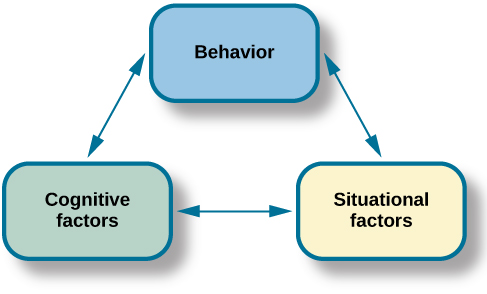| << Chapter < Page | Chapter >> Page > |

Consider, for example, that you’re at a festival and one of the attractions is bungee jumping from a bridge. Do you do it? In this example, the behavior is bungee jumping. Cognitive factors that might influence this behavior include your beliefs and values, and your past experiences with similar behaviors. Finally, context refers to the reward structure for the behavior. According to reciprocal determinism, all of these factors are in play.
Bandura’s key contribution to learning theory was the idea that much learning is vicarious. We learn by observing someone else’s behavior and its consequences, which Bandura called observational learning. He felt that this type of learning also plays a part in the development of our personality. Just as we learn individual behaviors, we learn new behavior patterns when we see them performed by other people or models. Drawing on the behaviorists’ ideas about reinforcement, Bandura suggested that whether we choose to imitate a model’s behavior depends on whether we see the model reinforced or punished. Through observational learning, we come to learn what behaviors are acceptable and rewarded in our culture, and we also learn to inhibit deviant or socially unacceptable behaviors by seeing what behaviors are punished.
We can see the principles of reciprocal determinism at work in observational learning. For example, personal factors determine which behaviors in the environment a person chooses to imitate, and those environmental events in turn are processed cognitively according to other personal factors.
Julian Rotter (1966) proposed the concept of locus of control, another cognitive factor that affects learning and personality development. Distinct from self-efficacy, which involves our belief in our own abilities, locus of control refers to our beliefs about the power we have over our lives. In Rotter’s view, people possess either an internal or an external locus of control ( [link] ). Those of us with an internal locus of control (“internals”) tend to believe that most of our outcomes are the direct result of our efforts. Those of us with an external locus of control (“externals”) tend to believe that our outcomes are outside of our control. Externals see their lives as being controlled by other people, luck, or chance. For example, say you didn’t spend much time studying for your psychology test and went out to dinner with friends instead. When you receive your test score, you see that you earned a D. If you possess an internal locus of control, you would most likely admit that you failed because you didn’t spend enough time studying and decide to study more for the next test. On the other hand, if you possess an external locus of control, you might conclude that the test was too hard and not bother studying for the next test, because you figure you will fail it anyway. Researchers have found that people with an internal locus of control perform better academically, achieve more in their careers, are more independent, are healthier, are better able to cope, and are less depressed than people who have an external locus of control (Benassi, Sweeney,&Durfour, 1988; Lefcourt, 1982; Maltby, Day,&Macaskill, 2007; Whyte, 1977, 1978, 1980).

Behavioral theorists view personality as significantly shaped and impacted by the reinforcements and consequences outside of the organism. People behave in a consistent manner based on prior learning. B. F. Skinner, a prominent behaviorist, said that we demonstrate consistent behavior patterns, because we have developed certain response tendencies. Mischel focused on how personal goals play a role in the self-regulation process. Albert Bandura said that one’s environment can determine behavior, but at the same time, people can influence the environment with both their thoughts and behaviors, which is known as reciprocal determinism. Bandura also emphasized how we learn from watching others. He felt that this type of learning also plays a part in the development of our personality. Bandura discussed the concept of self-efficacy, which is our level of confidence in our own abilities. Finally, Rotter proposed the concept of locus of control, which refers to our beliefs about the power we have over our lives. He said that people fall along a continuum between a purely internal and a purely external locus of control.

Notification Switch
Would you like to follow the 'Chapter 12: personality sw' conversation and receive update notifications?